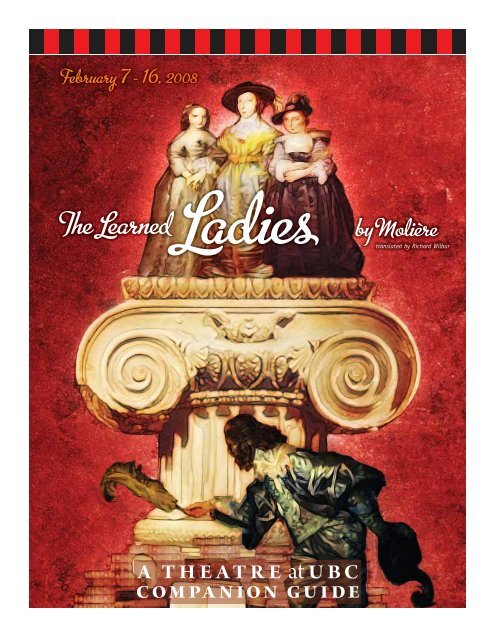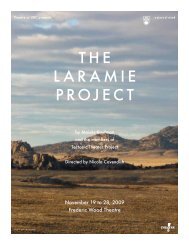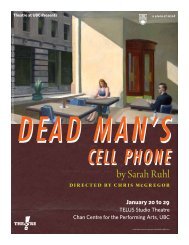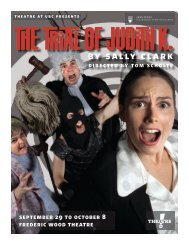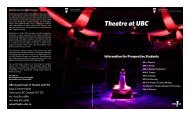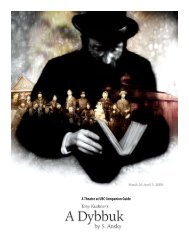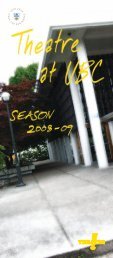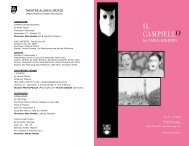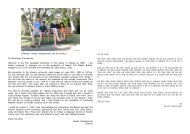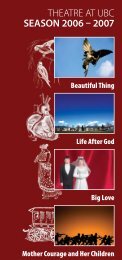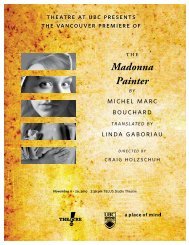The Learned - Theatre at UBC - University of British Columbia
The Learned - Theatre at UBC - University of British Columbia
The Learned - Theatre at UBC - University of British Columbia
You also want an ePaper? Increase the reach of your titles
YUMPU automatically turns print PDFs into web optimized ePapers that Google loves.
February 7 - 16, 2008<br />
<strong>The</strong> <strong>Learned</strong><br />
Ladies<br />
by Molière<br />
transl<strong>at</strong>ed by Richard Wilbur<br />
a the<strong>at</strong>re <strong>at</strong> ubc<br />
companion guide
Costume Design Renderings<br />
by Carmen Al<strong>at</strong>orre
<strong>The</strong> <strong>University</strong> <strong>of</strong> <strong>British</strong> <strong>Columbia</strong><br />
Department <strong>of</strong> <strong>The</strong><strong>at</strong>re and Film presents:<br />
transl<strong>at</strong>ed by Richard Wilbur<br />
Directed by P<strong>at</strong>rick Gauthier<br />
<strong>The</strong><strong>at</strong>re <strong>at</strong> <strong>UBC</strong><br />
FREDERIC WOOD THEATRE<br />
February 7–16, 2008<br />
Tickets: $20/$14/$10<br />
Phone: 604.822.2678<br />
www.the<strong>at</strong>re.ubc.ca<br />
Director<br />
Set Designer<br />
Costume Designer<br />
Lighting Designer<br />
Sound Designers<br />
P<strong>at</strong>rick Gauthier<br />
Stephania Schwartz<br />
Carmen Al<strong>at</strong>orre<br />
Kristin Robinson<br />
Craig Alfredson<br />
P<strong>at</strong>rick Caracas<br />
James Chen<br />
Stage Manager<br />
Michelle (Young-Bin) Ha<br />
February 7 to 16, 2008<br />
<strong>The</strong> Frederic Wood <strong>The</strong><strong>at</strong>re
Library and Archives Canada C<strong>at</strong>aloguing in Public<strong>at</strong>ion<br />
L'Heureux, Lisa, 1983-<br />
<strong>The</strong> <strong>The</strong><strong>at</strong>re <strong>at</strong> <strong>UBC</strong> companion guide to <strong>The</strong> learned ladies / by Lisa<br />
L'Heureux, Marion Landers.<br />
ISBN 978-0-88865-641-4<br />
1. Molière, 1622-1673. Femmes savantes. I. Landers, Marion, 1976-<br />
II. <strong>The</strong><strong>at</strong>re <strong>at</strong> <strong>UBC</strong>. III. Title. IV. Title: <strong>Learned</strong> ladies.<br />
PQ1833.L44 2008 842'.4 C2008-900682-8
Why?<br />
“If the business <strong>of</strong> comedy is<br />
to correct the vices <strong>of</strong> men by<br />
entertaining them, I don’t<br />
see why there should be any<br />
exceptions.” –Molière<br />
In about February <strong>of</strong> last year everyone I<br />
knew changed, suddenly, into unrelenting<br />
eight year olds.<br />
Why?<br />
Again and again. Over and over.<br />
Why?<br />
Friends, family, acquaintances.<br />
Why?<br />
And, to a person, their question was the<br />
same.<br />
Why did I want—why did I choose—to<br />
direct <strong>The</strong> <strong>Learned</strong> Ladies?<br />
<strong>The</strong> mob, unfortun<strong>at</strong>ely, would not accept<br />
“because Molière really pumps my nads” 1 as<br />
an answer. It wanted something pr<strong>of</strong>ound.<br />
Something deeply meaningful. Maybe<br />
something metaphorical.<br />
I would try to explain, try to slow down,<br />
try to articul<strong>at</strong>e, try to avoid sweeping<br />
generaliz<strong>at</strong>ions, try to describe, try to listen,<br />
try to finish a sentence without “I take th<strong>at</strong><br />
back” – I would try, but I would not be able<br />
to properly communic<strong>at</strong>e.<br />
Why?<br />
I was first exposed to Molière during the first<br />
year <strong>of</strong> my undergradu<strong>at</strong>e degree, when I was<br />
forced (how terrible it seemed <strong>at</strong> the time)<br />
to see the N<strong>at</strong>ional Arts Centre/Soulpepper<br />
<strong>The</strong><strong>at</strong>re co-production <strong>of</strong> <strong>The</strong> School for<br />
Wives (transl<strong>at</strong>ed by Richard Wilbur). And<br />
because I was an “if-it’s-not-altern<strong>at</strong>ivethe<strong>at</strong>re-I’m-not-interested”<br />
type <strong>of</strong> first-year<br />
the<strong>at</strong>re student, I h<strong>at</strong>ed it: it was too long,<br />
it was a period piece, and it was written in<br />
rhyme. Couplets! Why would anyone want<br />
to w<strong>at</strong>ch th<strong>at</strong>?<br />
<strong>The</strong> next year, however, the NAC presented<br />
a reading <strong>of</strong> another Molière piece (again,<br />
transl<strong>at</strong>ed by Richard Wilbur): <strong>The</strong> <strong>Learned</strong><br />
Ladies. I don’t remember much about the<br />
performance (except for the scarf Marti<br />
Maraden wore, reading the role <strong>of</strong> Bélise.<br />
It was thin and long and didn’t look very<br />
warm), but I do remember a sudden change<br />
<strong>of</strong> <strong>at</strong>titude (I was a very pragm<strong>at</strong>ic secondyear<br />
the<strong>at</strong>re student), thinking after the<br />
reading, “I should read more <strong>of</strong> this Molière<br />
(transl<strong>at</strong>ed by Richard Wilbur).”<br />
Years l<strong>at</strong>er—which would be roughly<br />
seventeen months ago if you’re reading this<br />
in February 2008; if it’s past th<strong>at</strong> d<strong>at</strong>e, you’ll<br />
have to do your own m<strong>at</strong>h—in a flurry<br />
<strong>of</strong> play reading, I would (re)discover <strong>The</strong><br />
<strong>Learned</strong> Ladies (I won’t bore you with the<br />
details, but I had to go to two libraries), and<br />
after weeks and weeks <strong>of</strong> reading and dozens<br />
and dozens <strong>of</strong> plays th<strong>at</strong> were becoming<br />
more indistinguishable with each play I read,<br />
something finally clicked.<br />
Why?<br />
It was funny. It was the<strong>at</strong>rical. It was ironic.<br />
It was subversive. It was bitingly s<strong>at</strong>irical.<br />
It was a period piece written in rhyming<br />
couplets (first-year the<strong>at</strong>re me was spinning<br />
in his grave!). It was now the only play I<br />
could think about.<br />
Why?<br />
It’s a play about hypocrisy, feminism, art,<br />
and rel<strong>at</strong>ionships. It’s about a woman trying<br />
to drag her household into the future while<br />
her husband desper<strong>at</strong>ely clings to the past.<br />
It’s about an opportunistic pedant – as slick<br />
and as captiv<strong>at</strong>ing as any politician, twentyfour<br />
hour news channel, or movie star –<br />
taking advantage <strong>of</strong> her good n<strong>at</strong>ure.<br />
<strong>The</strong> men are possessive and petulant, the<br />
women naïve, the children disobedient, the<br />
poets self-obsessed.<br />
<strong>The</strong>y lie, che<strong>at</strong>, steal, spy, thre<strong>at</strong>en, and<br />
conspire—usually two or more <strong>at</strong> a time—<br />
and they enjoy it. <strong>The</strong>se aren’t people I<br />
would invite over to my apartment, but I did<br />
choose to hang out with them a few nights a<br />
week, and I hope you enjoy your one.<br />
Director’s Notes<br />
P<strong>at</strong>rick Gauthier<br />
MFA Candid<strong>at</strong>e<br />
Department <strong>of</strong> <strong>The</strong><strong>at</strong>re and Film, <strong>UBC</strong><br />
1. <strong>The</strong> Breakfast Club. Screenplay and Dir.<br />
by John Hughes. Universal Pictures, 1985.<br />
5 | A <strong>The</strong><strong>at</strong>re <strong>at</strong> <strong>UBC</strong> Companion Guide
Why?<br />
A hundred reasons th<strong>at</strong> are constantly<br />
changing: yesterday, it was the play’s<br />
subversive sexuality. <strong>The</strong> day before, it was<br />
Wilbur’s brilliant transl<strong>at</strong>ion. Tomorrow, it<br />
might be the characters. Today, the s<strong>at</strong>ire.<br />
Or, it could be th<strong>at</strong> first time I read the play<br />
when, suddenly, I had to stop reading and<br />
double underline the text (forever scarring<br />
a library book). This was something very<br />
important. This was something I wanted<br />
everyone to know.<br />
We’ve many pseudo-wits and polished frauds<br />
Whose cleverness the time’s bad taste applauds.<br />
As true today as it was 336 years ago (again:<br />
you may have to do your own m<strong>at</strong>h).<br />
Th<strong>at</strong>’s why. Today, <strong>at</strong> least.<br />
Welcome!<br />
Stephen He<strong>at</strong>ley<br />
<strong>The</strong><strong>at</strong>re Program Chair<br />
Department <strong>of</strong> <strong>The</strong><strong>at</strong>re & Film, <strong>UBC</strong><br />
Welcome to <strong>The</strong><strong>at</strong>re <strong>at</strong> <strong>UBC</strong>! Tonight’s present<strong>at</strong>ion <strong>of</strong> Molière’s <strong>The</strong> <strong>Learned</strong> Ladies<br />
(<strong>of</strong> which we are very proud) represents the most public face <strong>of</strong> the <strong>The</strong><strong>at</strong>re Program <strong>of</strong><br />
the freshly minted Department <strong>of</strong> <strong>The</strong><strong>at</strong>re and Film. Students <strong>at</strong> all levels, under the<br />
supervision <strong>of</strong> our first-class staff and full-time and adjunct faculty, have been key in both<br />
its conceptualis<strong>at</strong>ion and execution. This production is the l<strong>at</strong>est iter<strong>at</strong>ion <strong>of</strong> a very active<br />
program <strong>of</strong> the<strong>at</strong>rical present<strong>at</strong>ions. I hope you caught Old Goriot and Hey Girl!, both part<br />
<strong>of</strong> the PuSh Intern<strong>at</strong>ional Performing Arts Festival, in January. If you didn’t, don’t miss<br />
Should’ve and A Dybbuk <strong>at</strong> the Frederic Wood <strong>The</strong><strong>at</strong>re in March.<br />
I would like to draw your <strong>at</strong>tention to the whirlwind <strong>of</strong> activity th<strong>at</strong> is taking place or is in the<br />
planning stages across our program. As a vast array <strong>of</strong> classes in the<strong>at</strong>re studies, design and<br />
production, dram<strong>at</strong>urgy, acting and the<strong>at</strong>re cre<strong>at</strong>ion unfold in the studios and lecture halls <strong>of</strong><br />
the Frederic Wood <strong>The</strong><strong>at</strong>re, the Royal Bank Cinema and the Binning and Somerset Studios,<br />
we are also preparing to host the annual conference <strong>of</strong> the Canadian Associ<strong>at</strong>ion <strong>of</strong> <strong>The</strong><strong>at</strong>re<br />
Research <strong>at</strong> the end <strong>of</strong> May, led by our intrepid leader, Acting Head Jerry Wasserman.<br />
Scholars and practitioners from across Canada and, indeed, the world will congreg<strong>at</strong>e to<br />
share their research and praxis for four days on the <strong>UBC</strong> campus. We are also preparing a<br />
major initi<strong>at</strong>ive to celebr<strong>at</strong>e the <strong>UBC</strong> centenary with our sister campus <strong>at</strong> <strong>UBC</strong> Okanagan<br />
in Kelowna. This collabor<strong>at</strong>ion will result in a co-cre<strong>at</strong>ion with the working title, This Neck<br />
<strong>of</strong> the Woods, which links our students with students in <strong>UBC</strong>O’s Department <strong>of</strong> Cre<strong>at</strong>ive<br />
Studies, and our own Tom Scholte with <strong>UBC</strong> alumnus and <strong>UBC</strong>O faculty member, Neil<br />
Cadger. W<strong>at</strong>ch for it in September <strong>at</strong> the Dorothy Somerset Studio <strong>The</strong><strong>at</strong>re here and the<br />
Mary Irwin <strong>The</strong><strong>at</strong>re in Kelowna.<br />
Our program takes another step into the intern<strong>at</strong>ional arena with the news th<strong>at</strong> David<br />
Savoy’s (MFA Directing) production <strong>of</strong> Diary <strong>of</strong> a Madman was chosen first <strong>of</strong> the two<br />
dozen other entries for the SETKANI/ENCOUNTER 2008 Intern<strong>at</strong>ional festival <strong>of</strong> student<br />
the<strong>at</strong>re in Brno, Czech Republic in April. <strong>The</strong> company <strong>of</strong> ten, including actors, designers,<br />
stage management and director, will share their highly imagin<strong>at</strong>ive and the<strong>at</strong>rically exciting<br />
adapt<strong>at</strong>ion <strong>of</strong> Gogol’s short story with the world. This is the first Canadian represent<strong>at</strong>ive to<br />
ever present <strong>at</strong> this prestigious event.<br />
I really could go on and on about the breadth <strong>of</strong> activity within our program: Canada’s<br />
N<strong>at</strong>ional Voice Intensive hosted by our program in May/June, the next incarn<strong>at</strong>ion <strong>of</strong> the<br />
Brave New Play Rites Festival in April, the auditions for <strong>UBC</strong>’s highly touted BFA acting<br />
program in February, the <strong>UBC</strong> Players’ Club’s present<strong>at</strong>ion <strong>of</strong> <strong>The</strong> Secret Keeper February<br />
7, 8 and 9 <strong>at</strong> the Dorothy Somerset, the exciting initi<strong>at</strong>ives being spear-headed by Robert<br />
Gardiner <strong>at</strong> our Gre<strong>at</strong> Northern Way campus. In our program, there is never a dull moment!<br />
And we are happy to have you with us for some <strong>of</strong> the fun!<br />
<strong>The</strong> <strong>Learned</strong> Ladies | 6<br />
Thanks for <strong>at</strong>tending <strong>The</strong> <strong>Learned</strong> Ladies and we look forward to seeing you in March.
From its first performances in 1672, Molière’s <strong>The</strong> <strong>Learned</strong> Ladies has troubled audiences.<br />
Although successfully received in its day and widely held to be one <strong>of</strong> Molière’s most<br />
ambitious comedies, questions have repe<strong>at</strong>edly been asked about the actual subject m<strong>at</strong>ter<br />
<strong>of</strong> the play. Was Molière passing judgment on the social and domestic effects <strong>of</strong> educ<strong>at</strong>ing<br />
women or was he making a comment on the dangers <strong>of</strong> educ<strong>at</strong>ion more generally? Is the play<br />
a s<strong>at</strong>ire <strong>of</strong> family life or a broader comedy <strong>of</strong> manners? Who, if anyone, is the hero <strong>of</strong> the work?<br />
Motiv<strong>at</strong>ing the action and s<strong>at</strong>ire <strong>of</strong> the play are the amorous inclin<strong>at</strong>ions <strong>of</strong> Henriette.<br />
Whether or not Henriette should be permitted to marry the man she loves prompts not just<br />
a series <strong>of</strong> arguments for and against marriage, but, more specifically, questions whether<br />
female educ<strong>at</strong>ion undermines the very institution <strong>of</strong> marriage.<br />
Compulsory mass educ<strong>at</strong>ion was not introduced in France until the l<strong>at</strong>e nineteenth century<br />
by the then minister <strong>of</strong> educ<strong>at</strong>ion, Jules Ferry. Prior to th<strong>at</strong>, the possibility <strong>of</strong> receiving<br />
an educ<strong>at</strong>ion was determined by both gender and class. Denied rights <strong>of</strong> citizenship and<br />
property, aristocr<strong>at</strong>ic women <strong>of</strong> the seventeenth and eighteenth centuries frequently met in<br />
small groups in an <strong>at</strong>tempt to cre<strong>at</strong>e an environment th<strong>at</strong> would support their own learning<br />
and promote a system <strong>of</strong> intellectual and moral values in opposition to women’s socially<br />
accepted roles as wives and mothers. <strong>The</strong> inherent transgression in this enterprise made<br />
women’s quest for knowledge a perfect subject for social s<strong>at</strong>ire.<br />
Molière and the<br />
Question <strong>of</strong> Trust<br />
K<strong>at</strong>hryn Brown<br />
Post-Doctoral Teaching Fellow<br />
Department <strong>of</strong> Art History,<br />
Visual Art and <strong>The</strong>ory, <strong>UBC</strong><br />
A little Learning is a dang’rous Thing<br />
–Alexander Pope, An Essay on Criticism<br />
By the time he wrote <strong>The</strong> <strong>Learned</strong> Ladies, Molière had already enjoyed considerable success<br />
by s<strong>at</strong>irizing the subject <strong>of</strong> female educ<strong>at</strong>ion (and self-educ<strong>at</strong>ion) in <strong>The</strong> Affected Ladies <strong>of</strong><br />
1659 and <strong>The</strong> School for Wives <strong>of</strong> 1662. If <strong>The</strong> <strong>Learned</strong> Ladies, one <strong>of</strong> Molière’s last plays, is to<br />
be read as a s<strong>at</strong>ire on female educ<strong>at</strong>ion, was the playwright simply revisiting a theme he had<br />
already tre<strong>at</strong>ed? Had the man who was once the court favourite <strong>of</strong> Louis xiv run out <strong>of</strong> ideas?<br />
<strong>The</strong> answer to both <strong>of</strong> those questions is ‘no’ for the principal reason th<strong>at</strong> <strong>The</strong> <strong>Learned</strong> Ladies<br />
is much more than a critique <strong>of</strong> the risks posed to domestic and social order by female<br />
educ<strong>at</strong>ion. At the heart <strong>of</strong> the play lie far broader and more subversive questions concerning<br />
authority, knowledge and trust. <strong>The</strong> learned ladies trust unthinkingly to the writings <strong>of</strong><br />
Vaugelas to determine m<strong>at</strong>ters <strong>of</strong> linguistic style and grammar. Chrysale and Philaminte<br />
struggle vainly against each other in an <strong>at</strong>tempt to establish authority within the family<br />
circle. Trissotin and Clitandre deb<strong>at</strong>e the power <strong>of</strong> critics and politicians to determine the<br />
f<strong>at</strong>e and remuner<strong>at</strong>ion <strong>of</strong> writers. In each case, the characters search for an authorit<strong>at</strong>ive source<br />
<strong>of</strong> inform<strong>at</strong>ion th<strong>at</strong> will valid<strong>at</strong>e their respective views <strong>of</strong> the world. And in each case they fail.<br />
<strong>The</strong> play is comprised <strong>of</strong> anti-heroes. <strong>The</strong> learned ladies are <strong>at</strong> once arrogant and gullible,<br />
falling prey to the pedantries <strong>of</strong> the wily and hypocritical Trissotin. However, the male<br />
characters in the play are not held out as morally superior to their female counterparts. <strong>The</strong><br />
weak-willed Chrysale is bullied by his wife and prepared to negoti<strong>at</strong>e away his daughter’s<br />
happiness. Clitandre readily swaps his affections from one sister to the other after his<br />
amorous advances have been rejected. <strong>The</strong> result is th<strong>at</strong> the play denies its audience a clear<br />
moral. Each character is flawed in some way.<br />
It is precisely this levelling <strong>of</strong> the characters th<strong>at</strong> leads to the final subversion <strong>of</strong> authority<br />
in the work, namely th<strong>at</strong> <strong>of</strong> the playwright himself. Molière does not afford his audience the<br />
luxury <strong>of</strong> guidance by a clear authorial intention and, instead, disappears behind a display <strong>of</strong><br />
brilliant linguistic invention. <strong>The</strong> audience is left to trust only to itself in its judgment <strong>of</strong> the<br />
characters and their motiv<strong>at</strong>ions.<br />
In its questioning <strong>of</strong> the found<strong>at</strong>ions <strong>of</strong> knowledge, the message <strong>of</strong> Molière’s play remains as<br />
relevant today as it did in the seventeenth century. In an age where the flow <strong>of</strong> inform<strong>at</strong>ion<br />
is relentless, Molière reminds us th<strong>at</strong> the onus is on each individual to determine which<br />
intellectual authorities to accept and in whom to trust.<br />
7 | A <strong>The</strong><strong>at</strong>re <strong>at</strong> <strong>UBC</strong> Companion Guide
Some thoughts on<br />
Molière and<br />
<strong>The</strong> <strong>Learned</strong> Ladies<br />
Jean Herbiet<br />
Pr<strong>of</strong>essor Emeritus<br />
<strong>The</strong><strong>at</strong>re Department<br />
<strong>University</strong> <strong>of</strong> Ottawa<br />
Transl<strong>at</strong>ed by Lisa L’Heureux<br />
<strong>The</strong> <strong>Learned</strong> Ladies | 8<br />
To begin with, it would be advisable to<br />
remind the audience th<strong>at</strong> the term comedy<br />
has not always had the same meaning th<strong>at</strong><br />
we give to it today: play intended to provoke<br />
laughter or make smile. A few gener<strong>at</strong>ions<br />
ago, in Europe, aller à la comédie, which<br />
transl<strong>at</strong>es as “going to the comedy,” simply<br />
referred to going to the the<strong>at</strong>re.<br />
Th<strong>at</strong> being said, it is important to classify<br />
the term laughter according to how it is<br />
triggered. Initially, it is an immedi<strong>at</strong>e<br />
physiological manifest<strong>at</strong>ion <strong>of</strong> cheerfulness<br />
in reaction to an unexpected event which<br />
has just occurred and which escapes r<strong>at</strong>ional<br />
common sense. In a way, laughter is the<br />
refusal <strong>of</strong> a situ<strong>at</strong>ion, <strong>of</strong> actions, discourses<br />
th<strong>at</strong> come from a social norm. It is also<br />
the indic<strong>at</strong>or <strong>of</strong> a certain culture: from<br />
community to community, from people to<br />
people, from race to race, we do not find<br />
the same things humorous. However, this<br />
immedi<strong>at</strong>e and unpredicted reaction can<br />
also have been fabric<strong>at</strong>ed. This is the case<br />
with stand-up comics and, <strong>of</strong> course, writers<br />
<strong>of</strong> farce and comedy who can predict in<br />
their writing situ<strong>at</strong>ions th<strong>at</strong> will almost<br />
immedi<strong>at</strong>ely make their audience laugh.<br />
<strong>The</strong> case <strong>of</strong> Molière is exemplary on<br />
this subject. However, the writer <strong>of</strong> <strong>The</strong><br />
Misanthrope <strong>of</strong>ten suffers from his universal<br />
reput<strong>at</strong>ion <strong>of</strong> comic author or farceur, joker.<br />
Nonetheless, there are p<strong>at</strong>hetic situ<strong>at</strong>ions in<br />
some <strong>of</strong> his plays th<strong>at</strong> come near the tragic<br />
genre: in Tartuffe, the f<strong>at</strong>her Orgon decides<br />
to give his daughter Mariane in marriage<br />
to Tartuffe, his protégé. But Mariane<br />
loves a young man named Valère. In act<br />
four, scene three, it is on her knees, while<br />
crying, th<strong>at</strong> she begs her f<strong>at</strong>her to defer his<br />
decision: r<strong>at</strong>her than marrying Tartuffe,<br />
she will seek asylum in a convent. In this<br />
same play, Tartuffe, whose wickedness and<br />
the advances made towards Elmire, Orgon’s<br />
wife, we have just discovered, will drive out<br />
his host family without warning from the<br />
ancestral house th<strong>at</strong> Orgon had given to him<br />
so naively.<br />
One will certainly disagree by reminding<br />
me th<strong>at</strong> the language and the behaviour <strong>of</strong><br />
certain characters derive in fact from the<br />
comedic conduct <strong>of</strong> the farces <strong>of</strong> the Middle<br />
Ages if not from the Greco-L<strong>at</strong>in comedies,<br />
without mentioning Commedia Dell’Arte or<br />
Spanish Commedia. I will answer calmly<br />
with wh<strong>at</strong> Molière says <strong>of</strong> his work as a<br />
playwright in the Premier placet présenté au<br />
Roi sur la comédie de Tartuffe; here we are<br />
in August 1664. “Sire, the duty <strong>of</strong> comedy<br />
is to correct men by entertaining them, I<br />
thought, in the occup<strong>at</strong>ion th<strong>at</strong> I find myself,<br />
th<strong>at</strong> I had nothing better to do than to <strong>at</strong>tack<br />
the vices <strong>of</strong> my century by painting them<br />
ridiculously.” In a way, <strong>of</strong> his own will,<br />
Molière, without knowing it, was both a<br />
sociologist and a behaviourist psychologist.<br />
In fact, his universe, before being comedic,<br />
is a world <strong>of</strong> verbal and physical violence, a<br />
perpetual confront<strong>at</strong>ion between aggressive<br />
people and the exploited, a world <strong>of</strong> trickery,<br />
lies, pride, vanity, cowardice, imposture,<br />
slander and <strong>of</strong> wickedness (Trissotin).<br />
It is true th<strong>at</strong> tradition seems to give Molière<br />
an irrepressible liking for broad physical<br />
humour, with which he sometimes briefly<br />
adorns some <strong>of</strong> his gre<strong>at</strong>est plays: physical<br />
intimid<strong>at</strong>ions, pursuits, blows, insults,<br />
slap stick. However, in my opinion, these<br />
scenes <strong>of</strong> brutality should not be tre<strong>at</strong>ed<br />
and staged as broad physical humour or<br />
as choreographed gags with more or less<br />
enjoyment, but r<strong>at</strong>her with a fairly ordinary<br />
realism: verbal abuse, challenges to duel,<br />
the thre<strong>at</strong> <strong>of</strong> assaults, torment, expeditious<br />
justice which is commonplace in a society<br />
th<strong>at</strong> has not yet moved to legisl<strong>at</strong>e on human<br />
rights. Children, women, and servants<br />
were be<strong>at</strong>en or whipped. Molière's plays<br />
reveal to us with a photographic accuracy<br />
the <strong>at</strong>mosphere <strong>of</strong> adventure, <strong>of</strong> passion,<br />
or immorality, <strong>of</strong> cynicism, <strong>of</strong> chaos, <strong>of</strong><br />
brutality and <strong>of</strong> cruelty in which lived the<br />
Gre<strong>at</strong>, the bourgeois and the ordinary<br />
French people <strong>of</strong> the seventeenth century.<br />
In wh<strong>at</strong> concerns <strong>The</strong> <strong>Learned</strong> Ladies, which<br />
I consider to be Molière’s best play alongside<br />
<strong>The</strong> Misanthrope, through the moulding <strong>of</strong><br />
the temperament and behaviour <strong>of</strong> each <strong>of</strong><br />
his characters, the playwright paid particular<br />
<strong>at</strong>tention to three women who wanted to<br />
free themselves from the three constraints<br />
th<strong>at</strong> Man had used to imprison his wife since<br />
the Neolithic era: the regular bearing <strong>of</strong><br />
children, housework and weaving, and the<br />
family budget.
<strong>The</strong>y wish to quickly emancip<strong>at</strong>e themselves.<br />
In doing so, they are <strong>of</strong>ten awkward and<br />
sometimes in bad faith, naive, credulous,<br />
sc<strong>at</strong>terbrained; even so, their desire for<br />
emancip<strong>at</strong>ion is not so much to become<br />
learned, but r<strong>at</strong>her to <strong>at</strong>tain knowledge<br />
freely as human beings. <strong>The</strong>y do not lose<br />
anything <strong>of</strong> their faults and qualities which<br />
are prone to Molière’s <strong>at</strong>tacks, especially<br />
when they fl<strong>at</strong>ter a ridiculous avant-garde<br />
poet who only seeks young Henriette’s<br />
dowry. However, they read: Pl<strong>at</strong>o, Épicure,<br />
Descarte, Vaugelas. And it is not Chrysale,<br />
the f<strong>at</strong>her <strong>of</strong> the family, who reads them.<br />
<strong>The</strong> <strong>Learned</strong> Ladies is not an extension <strong>of</strong> <strong>The</strong><br />
Affected Ladies (Les Précieuses Ridicules): it is<br />
the first somewh<strong>at</strong> conceited steps <strong>of</strong> zealous<br />
neophytes who decided th<strong>at</strong> intellectual<br />
activity was not exclusive to men.<br />
Regardless <strong>of</strong> gender, each human being<br />
belongs first and foremost to themselves<br />
and is responsible for the extent <strong>of</strong> their<br />
own knowledge, and consequently, to its<br />
system<strong>at</strong>ic re-examin<strong>at</strong>ion, which drives<br />
evolution. Like the courageous feminists <strong>of</strong><br />
the twentieth century, Philaminte, Armande<br />
and Bélise are susceptible to the ironies<br />
<strong>of</strong> an archaic society whose earthly f<strong>at</strong>e as<br />
men and women was consecr<strong>at</strong>ed by Saint<br />
Paul in <strong>The</strong> Act <strong>of</strong> the Apostles on the issue <strong>of</strong><br />
women having to be veiled during prayer: “A<br />
man should not cover his head, because he<br />
is the image and glory <strong>of</strong> God, but woman<br />
is the glory <strong>of</strong> man. For man did not come<br />
from woman, but woman from man.” (I<br />
Corinthians 11).<br />
If we refer to laic society, the French Civil<br />
Code which was cre<strong>at</strong>ed by Napoléon<br />
Bonaparte in 1804 registered article 213<br />
as: “<strong>The</strong> husband owes protection to his<br />
wife, the wife obedience to her husband.”<br />
This ridiculous item was only rescinded in<br />
1938; but it was only in the year 1946 th<strong>at</strong><br />
the French Constitution recognized the<br />
principle <strong>of</strong> equality between men and<br />
women. In an aside, in 1810, adultery was an<br />
<strong>of</strong>fence th<strong>at</strong> led to imprisonment for women,<br />
and punished by a fine for men. In addition,<br />
the “conjugal right” was an oblig<strong>at</strong>ion.<br />
Let us finish with a note th<strong>at</strong> Molière or<br />
his <strong>Learned</strong> Ladies could have made use <strong>of</strong><br />
to get a good laugh out <strong>of</strong> its audience had<br />
they lived <strong>at</strong> the beginning <strong>of</strong> the twentieth<br />
century: “1909! Article <strong>of</strong> Law: <strong>The</strong> feminine<br />
port <strong>of</strong> pants is not an <strong>of</strong>fence if the woman<br />
holds by the hand the handlebar <strong>of</strong> a bicycle<br />
or <strong>of</strong> the reins <strong>of</strong> a horse.” I would add: “...<br />
th<strong>at</strong> is not her husband.” You would almost<br />
think this was the work <strong>of</strong> Ionesco!<br />
Long life to all <strong>of</strong> the Philamintes <strong>of</strong> this<br />
world!<br />
Greetings to all my Vancouver friends!<br />
Above: Set Design Rendering by Stephania Schwartz<br />
My inspir<strong>at</strong>ion for the set design <strong>of</strong> <strong>The</strong> <strong>Learned</strong> Ladies<br />
was to re-cre<strong>at</strong>e, in some sense, Molière’s microcosm <strong>of</strong> French<br />
social and intellectual politics as a reaction to courtly life in the<br />
17th century. I wanted a sense <strong>of</strong> wh<strong>at</strong> these salons were really<br />
like; a decor and prop design/placement th<strong>at</strong> would reveal the<br />
true n<strong>at</strong>ure <strong>of</strong> the salon—a b<strong>at</strong>tle ground essentially. <strong>The</strong>re<br />
were, <strong>of</strong> course, serious and simultaneously exclusive salons for<br />
the intellegansia and liter<strong>at</strong>i such as C<strong>at</strong>herine de Vivonne’s<br />
“Hotel de Rambouillet”, a reaction to which, were the less<br />
‘reputable’ and ‘exclusive’ salons th<strong>at</strong> Molière s<strong>at</strong>irizes in his<br />
play. Molière’s salon, in <strong>The</strong> <strong>Learned</strong> Ladies portrays the 17th<br />
century problem <strong>of</strong> women who are obssessed with appearing<br />
intellectual while eschewing actual intellect. Centuries l<strong>at</strong>er, this<br />
is still a relevant topic as we w<strong>at</strong>ch the media and the public in a<br />
vicious circle <strong>of</strong> image-obsession.
1 2<br />
4 5<br />
7<br />
8<br />
10 11
3 13 14 15<br />
16 17 18<br />
19<br />
20 21<br />
22 23<br />
1. Gord Myren<br />
2. Jeff Kaiser<br />
3. Shaun Aquiline<br />
4. Maura Halloran<br />
5 K<strong>at</strong>e Hilderman<br />
6. Yoshie Bancr<strong>of</strong>t<br />
7. Maryanne Renzetti<br />
8. Aslam Husain<br />
9. Michael Neale<br />
10. Courtney Lancaster<br />
11. Nick Fontaine<br />
12. Michelle (Young-Bin) Ha<br />
13. Irena Hoti<br />
14. P<strong>at</strong>rick Caracas,<br />
James Chen,<br />
Craig Alfredson<br />
15. P<strong>at</strong>rick Gauthier<br />
16. Jason Ho<br />
17. Tim Bellefleur<br />
18. Kristin Robinson<br />
19. Ryan Warden<br />
20. Benjamin Cheung<br />
21. Stephania Schwartz<br />
22. Annie Jang<br />
23. Carmen Al<strong>at</strong>orre
Costume Design Rendering<br />
by Carmen Al<strong>at</strong>orre<br />
Cast<br />
Chrysale<br />
Philaminte<br />
Armande<br />
Henriette<br />
Ariste<br />
Bélise<br />
Clitandre<br />
Trissotin<br />
Vadius, A Notary<br />
Martine<br />
Lépine, Julien<br />
Gord Myren<br />
Maura Halloran<br />
Maryanne Renzetti<br />
Courtney Lancaster<br />
Shaun Aquiline<br />
K<strong>at</strong>e Hilderman<br />
Aslam Husain<br />
Nick Fontaine<br />
Jeff Kaiser<br />
Yoshie Bancr<strong>of</strong>t<br />
Michael Neale<br />
Acknowledgements<br />
Suzanne Bouclin, Arts Club <strong>The</strong><strong>at</strong>re, Daiset Ruiz Sarquis,<br />
Vancouver Playhouse <strong>The</strong><strong>at</strong>re Company<br />
Please turn <strong>of</strong>f all pagers and cellular telephones.<br />
No cameras or recording devices are permitted during the performance.<br />
<strong>The</strong> <strong>Learned</strong> Ladies | 12
Director<br />
Directing Advisor<br />
Production Manager<br />
Stage Manager<br />
Assistant Stage Managers<br />
Stage Management Advisor<br />
Technical Director<br />
Assistant Technical Director<br />
Set Designer<br />
Set Advisor<br />
Assistant Set Designer<br />
Set Construction<br />
Lighting Designer<br />
Lighting Design Advisor<br />
Assistant Lighting Designer<br />
Lighting Oper<strong>at</strong>or<br />
Lighting Crew<br />
Costume Designer<br />
Assistant Costume Designers<br />
Sound Designers<br />
Sound Oper<strong>at</strong>or<br />
Wardrobe Supervisor<br />
Costume Cutter<br />
Costume Assistants<br />
Properties Supervisors<br />
Properties Builders<br />
Props Crew Chief<br />
P<strong>at</strong>rick Gauthier<br />
Stephen He<strong>at</strong>ley<br />
Jay Henrickson<br />
Michelle (Young-Bin) Ha<br />
Tim Bellefleur, Benjamin Cheung,<br />
Annie Jang<br />
Bob Eberle<br />
Jim Fergusson<br />
Daniel Jang<br />
Stephania Schwartz<br />
Ronald Fedoruk<br />
Irena Hoti<br />
Erin Samuda, Jay Taylor,<br />
Wladimiro Woyno<br />
Kristin Robinson<br />
Ronald Fedoruk<br />
Jason Ho<br />
Ryan Warden<br />
Daniel Jang, Hana Johnson,<br />
Chris Littman, Ryan Warden,<br />
Wladimiro Woyno<br />
Carmen Al<strong>at</strong>orre<br />
Chantelle Balfour, Olena Dubova,<br />
Jessica Jeffery<br />
Craig Alfredson, P<strong>at</strong>rick Caracas,<br />
James Chen<br />
Sally Song<br />
Jean Driscoll-Bell<br />
Charlotte Burke<br />
Candice Barrans, Esther Chen,<br />
Shira Elias, Jessica Jeffery, Minah Lee,<br />
Jin Qin, Sally Song<br />
Janet Bickford, Lynn Burton<br />
Chap Chan, Esther Chen,<br />
Julian Darius, Rob Higgins, Amanda<br />
Larder, Laura McLean,<br />
Lisa Rosenberg<br />
Jin Qin<br />
Production<br />
13 | A <strong>The</strong><strong>at</strong>re <strong>at</strong> <strong>UBC</strong> Companion Guide
Production<br />
Scenic Artist<br />
Scenic Painters<br />
Crew<br />
Projections Design<br />
Projections Form<strong>at</strong>ting<br />
Projectionist<br />
Dressers<br />
Makeup Consultant<br />
Makeup Team Leader<br />
Makeup & Wig Assistant<br />
Hair & Wig Stylist<br />
Publicist<br />
Production Website<br />
Production Poster Design & Illustr<strong>at</strong>ion<br />
Lorraine West<br />
Amanda Larder, Stephania Schwartz,<br />
Stacy Sherlock<br />
Madeleine Copp, Emily Hartig,<br />
Min-Kyung Kang<br />
Stephania Schwartz<br />
Irena Hoti<br />
Christina Istr<strong>at</strong>e<br />
Chantelle Balfour, Zoe Green,<br />
Basha Ladovsky, Laura McLean<br />
Jill Wyness<br />
Jessica Jeffery<br />
Sara Martens<br />
Jill Wyness<br />
Deb Pickman<br />
Linda Fenton Malloy<br />
Harry Bardal Graphics<br />
Biographies<br />
<strong>The</strong> <strong>Learned</strong> Ladies | 14<br />
Annie Jang (noun) feminine: 1) a. 3rd<br />
year BFA candid<strong>at</strong>e in the<strong>at</strong>re production<br />
and design b. minor in history 2)<br />
ASM for Mother Courage and De<strong>at</strong>h and<br />
Taxes, both in 2007 3) Anime-loving, Canucks<br />
fan who is addicted to video games.<br />
4) <strong>of</strong> the species topazio scorpiollae rabbit<strong>at</strong>us<br />
ORIGIN: l<strong>at</strong>e 20th century, <strong>of</strong> Chinese-<br />
Canadian descent, hailing from Vancouver,<br />
Canada (and currently still residing there)<br />
For thesaurus, see also: reformed procrastin<strong>at</strong>or(?),<br />
recent Mac converter, mushroom<br />
Aslam Percival Husain (noun) masculine:<br />
1) a. Actor b. filmmaker, writer, drinker <strong>of</strong> tea<br />
c. 2Pac fan<strong>at</strong>ic 2) (verb) to act overly alo<strong>of</strong> so<br />
as to appear mysterious 3) (adjective) a. being<br />
purposefully l<strong>at</strong>e so as to make an entrance,<br />
e.g. “Here he comes, Aslam as usual.”<br />
<strong>The</strong>saurus: Gentleman, Charmer,<br />
gym r<strong>at</strong>, chameleon, ex-smoker, idealist,<br />
cynic,revolutionary, Napoleon,<br />
mass <strong>of</strong> contradictions, muppet-panic.<br />
Antithesis: Cowboy<br />
> ORIGIN [Often mistaken as “ Aslan” the<br />
lion from the popular C.S. Lewis novel <strong>The</strong><br />
Lion, the Witch and the Wardrobe. Aslam<br />
transl<strong>at</strong>es from Arabic to “Trustworthy” or<br />
“Better, More Perfect”... [Look it up if you<br />
don’t believe me. But you should trust me.]<br />
Benjamin Cheung (noun) masculine:<br />
1) stage manager in-training. <strong>UBC</strong> BFA <strong>The</strong><strong>at</strong>re<br />
candid<strong>at</strong>e. 2) a lanky fellow <strong>of</strong>ten mistaken<br />
for a small cave-like cre<strong>at</strong>ure when lurking<br />
in the Freddy basement corridors. 3) avid adventurer<br />
<strong>of</strong> people and things th<strong>at</strong> make him<br />
happy including (but not limited to) growing<br />
up with close friends, cre<strong>at</strong>ing the<strong>at</strong>re and<br />
films, Norbert and M<strong>at</strong>hilda, Bessie-Ann,<br />
and Pinky and <strong>The</strong> Brain.<br />
ORIGIN l<strong>at</strong>e 20th cent.: from west coast Canadian<br />
benisawesome.<br />
USAGE In general use, Ben (as opposed to<br />
Benjamin) is widely used.<br />
THESAURUS go<strong>of</strong>y, feisty, awkward, crazy,<br />
complic<strong>at</strong>ed.
Carmen Al<strong>at</strong>orre /KARR-mehn A-lah-tourreh/<br />
(noun) feminine: 1) Of or pertaining to<br />
the ones th<strong>at</strong> come from the land <strong>of</strong> tequila.<br />
2) Background in Art History currently being<br />
reapplied designing costumes as part <strong>of</strong><br />
a MFA program 3) One hot tamale. 4) Has<br />
been spotted whipping up costumes for such<br />
recent local productions as Gypsy (Stanley<br />
<strong>The</strong><strong>at</strong>re/Arts Club) Stupid Little Girls (Hem<br />
Gallery) Futuristi (<strong>UBC</strong>/Bella Luna) and <strong>The</strong><br />
Stone Face (W<strong>at</strong>erfront <strong>The</strong><strong>at</strong>re)<br />
Courtney Lancaster (noun) feminine: 1) a.<br />
actor b. singer, musician, book-addict, nerdy<br />
girl. c. BFA Acting Candid<strong>at</strong>e (2008) 2) gr<strong>at</strong>eful<br />
new gradu<strong>at</strong>e, e.g. 3) former endangered bird<br />
guardian, camp counsellor and unreliable<br />
Metro newspaper delivery-girl (quit after one<br />
week). N<strong>at</strong>ive species <strong>of</strong> Nova Scotia, origins<br />
in Malaysia and England pere/mere: Ian and<br />
Lai Im, freres/soeurs: Sarah, David, Mark<br />
For <strong>The</strong>saurus, see also: House-plant killer, Big<br />
Love-Mother Courage-Medea Redux performer,<br />
gum-boot dancer, giddy unfocused giggler.<br />
Additionally: Je t’aime (French).<br />
Gordon Douglas Myren (noun) masculine:<br />
1) a. Actor b. <strong>UBC</strong> Student c. BFA Candid<strong>at</strong>e<br />
2) a. Musician b. Producer <strong>of</strong> Music 3) Man<br />
who plays the role <strong>of</strong> Chrysale in Moliere’s<br />
<strong>The</strong> <strong>Learned</strong> Ladies 4) Has been known to<br />
produce <strong>The</strong><strong>at</strong>re via Enlightenment Society<br />
including Andrey Summers’ Lovestruck: A<br />
Romantic Comedy Set in the Horrific World<br />
<strong>of</strong> H.P. Lovecraft.<br />
see also: Irish Merrymaker, Viking Lord, Pir<strong>at</strong>e<br />
James Chen (noun) masculine: 1) a. sound<br />
designer b. independent filmmaker, set designer,<br />
lighting designer, technician, magician<br />
c. BFA undergrad 2) worked on several<br />
productions in sound design both inside and<br />
outside <strong>of</strong> <strong>UBC</strong> 3) knows how to curse in<br />
multiple languages<br />
a Taiwanese, holding a Canadian citizenship.<br />
Legal name Chi-An Chen; usually don’t understand<br />
a play when go to see it, unless there<br />
are subtitles.<br />
Jeff Kaiser (noun) masculine : 1) a. actor b.<br />
dancer/mover, visual artist, musician/ composer,<br />
writer, anim<strong>at</strong>or, small business owner,<br />
(soon to be) home owner, video game fan<strong>at</strong>ic<br />
c. jew 2) theoretical physicist (noun form):<br />
took theoretical physics classes for his science<br />
requirement/ for fun reads physics text<br />
books 3) novice ghost hunter, certified diver,<br />
trained under Lecoq pedagogy<br />
N<strong>at</strong>ive species <strong>of</strong> Washington St<strong>at</strong>e, birthed:<br />
Harrisburg Pennsylvania, resides in Canada.<br />
legal cre<strong>at</strong>ors: John and Diane, legal siblings:<br />
Mitchell.<br />
For thesaurus, see also:(english) toy collector,<br />
agnostic, metrosexual.<br />
K<strong>at</strong>e Hilderman (noun) feminine: 1) a. Actor<br />
b. Avid dancer c. Daughter d. Lover/Friend<br />
(not in any particular order) 2) Belongs to the<br />
class <strong>of</strong> wonderlust artists planning on taking<br />
the world by storm 3) Most likely found<br />
in black box studios, english liter<strong>at</strong>ure classrooms,<br />
or the local pub<br />
Kristin Robinson (noun) feminine: 1) Lighting<br />
Designer b. Gradu<strong>at</strong>ing with a double<br />
major in <strong>The</strong><strong>at</strong>re and English 2) Smiley eg. <<br />
Kristin has a hard time wiping a smile <strong>of</strong>f her<br />
face> 3) a. One <strong>of</strong> the boys b. Worked <strong>at</strong> a fish<br />
plant and a mine<br />
N<strong>at</strong>ive Species <strong>of</strong> Prince Rupert, BC but is<br />
able to adapt to the city <strong>of</strong> Vancouver, thrives<br />
in the rain, without an umbrella.<br />
Maryanne Renzetti (noun) feminine : 1)<br />
a. Actor b. Starbucks C<strong>of</strong>fee Wench c. Book<br />
Worm d. Daughter e. Costume Collector f.<br />
BFA candid<strong>at</strong>e 2) Collector <strong>of</strong> Strange Personalities<br />
e.g. < Maryanne has been known<br />
to randomly talk as another person for a given<br />
period <strong>of</strong> time, and enjoys naming these various<br />
personalites. Please note: This is nothing<br />
to be worried about, it is not clinical--she is<br />
technically sane)> 3) Gradu<strong>at</strong>ed high school<br />
as “Most likely to end up an eccentric grandmother,<br />
wearing a bunny suit and riding a<br />
motorcycle while speaking in tongues”<br />
N<strong>at</strong>ive species <strong>of</strong> Port Coquitlam, though<br />
has inhabited Surrey, East Vancouver, Port<br />
Moody, Maple Ridge and Kitsilano. Has been<br />
seen in such productions as Fe<strong>at</strong>uring Loretta,<br />
15 | A <strong>The</strong><strong>at</strong>re <strong>at</strong> <strong>UBC</strong> Companion Guide
Shadows <strong>of</strong> Troy (<strong>The</strong><strong>at</strong>re <strong>at</strong> <strong>UBC</strong>), <strong>The</strong> Taming<br />
<strong>of</strong> the Shrew and Les Belles Souers (Douglas<br />
College).<br />
Maura Halloran (noun) feminine: 1) a. actor<br />
b. playwright studying in <strong>UBC</strong>’s Cre<strong>at</strong>ive<br />
Writing Department c. poet, songwriter,<br />
singer, painter’s model, publicist, communic<strong>at</strong>ions<br />
guru d. BFA Acting Candid<strong>at</strong>e, Final<br />
Year 2) gradu<strong>at</strong>e <strong>of</strong> the London School <strong>of</strong><br />
Economics with a Master’s degree in Compar<strong>at</strong>ive<br />
Politics (Research) 3) a. terrible<br />
friend who never calls anyone back anymore<br />
b. high-maintenance girlfriend who does not<br />
deserve her loving partner 4) luckiest daughter<br />
/ sister in the whole world<br />
mère/père: Virginia & Philip, frères: Brendan<br />
& Kieran, belle-soeur: Jenny, amoureux: Andrew<br />
N<strong>at</strong>ive <strong>of</strong> Toronto, this specimen has also<br />
been sighted on stage / screen in Edmonton,<br />
Calgary and Vancouver, including Blackbird<br />
<strong>The</strong><strong>at</strong>re’s Jessie-winning Peer Gynt. Appears<br />
this year as Helena in Midsummer, Pelajia in<br />
Rez Sisters, Philaminte in <strong>Learned</strong> Ladies and<br />
Leah in A Dybbuk. If funds avail, will travel to<br />
Brno, CZ for Encounter 2008 the<strong>at</strong>re school<br />
competition in the cast <strong>of</strong> Diary <strong>of</strong> a Madman.<br />
Synonyms: crybaby, tea-granny, c<strong>at</strong> worshipper,<br />
feminist, modernist, choc-a-holic, Liberal<br />
Antonyms: ne<strong>at</strong> freak, morning person,<br />
laissez-faire, Lady<br />
Michael Neale (masculine) noun: 1) Actor<br />
and student <strong>of</strong> the BFA Acting program.<br />
eg < Michael Neale was an actor in <strong>Learned</strong><br />
Ladies, along with Shadows <strong>of</strong> Troy and Bright<br />
Lights.> 2) A tickler <strong>of</strong> the ivories (and the<br />
ebonies) 3) Pantaloon-wearer.<br />
Also see: bit-part player. eg. <br />
Michael Neale-s are found mainly in Vancouver,<br />
though they have been seen elsewhere.<br />
Researchers say they will probably next be<br />
seen performing Peter Boychuk’s Afterglow<br />
in an outdoor venue near you.<br />
Michelle Ha (noun) feminine : 1) a. Youngbin<br />
Ha b. the youngest daughter <strong>of</strong> three c.<br />
BFA candid<strong>at</strong>e d. stage manager wannabe<br />
e. the best daughter in the world wannabe.<br />
2) Korean 3) not Canadian<br />
N<strong>at</strong>ive species <strong>of</strong> Seoul. Often feels lost<br />
in Vancouver. Only found <strong>at</strong> <strong>UBC</strong> the<strong>at</strong>re<br />
building.<br />
For thesaurus, see also:(english) vertically<br />
challenged, dark-circle, crazy, brave<br />
Nick Fontaine |nik fon-tayn|, noun, archaic<br />
or poetic/literary 1) an actor/BFA candid<strong>at</strong>e,<br />
gradu<strong>at</strong>ing from <strong>UBC</strong>, usually <strong>of</strong> dwindling<br />
or diminuitive talent and perspective 2) active<br />
human being, engaged in a) drumming,<br />
b) designing/writing, c) technical the<strong>at</strong>re,<br />
d) hiking/mountain climbing, e) bo<strong>at</strong>ing, f)<br />
bringing in the noise e.g. “<strong>The</strong> quick brown<br />
fox jumped over the lazy Nick Fontaine.”<br />
3) former security guard/publicist/construction<br />
worker/telemarketer/pr<strong>of</strong>essional caroler<br />
Deriv<strong>at</strong>ives: Jean and Debra Fontaine,<br />
French (nouns), Cortes Island, Spanish<br />
(place name)<br />
ORIGIN: from Greek Nikolaos meaning<br />
“victory <strong>of</strong> the people”, from French fontaine<br />
meaning “fountain”<br />
<strong>The</strong>saurus: blowhard, narcissist, n<strong>at</strong>ure enthusiast,<br />
eccentric, jobless roustabout<br />
Also see: A Dybbuk, in production March<br />
2008, <strong>The</strong><strong>at</strong>re <strong>at</strong> <strong>UBC</strong><br />
P<strong>at</strong>rick Caracas (noun) masculine: 1) Brazilian-American<br />
musician, filmmaker, composer,<br />
and producer. BFA candid<strong>at</strong>e for the<br />
Film production program 2) Metal guitarist<br />
for the band Carthage, from Vancouver, B.C.,<br />
and Unconscious Disturbance from Sao Paulo,<br />
Brazil 3) Cultiv<strong>at</strong>or <strong>of</strong> the afro hair, believer<br />
<strong>of</strong> “ears as the window to the soul”<br />
<strong>The</strong>saurus see also: (english) hell lotta distortion,<br />
jackson guitars, sc<strong>at</strong>man (Ski-Ba-Bop-<br />
Ba-Dop-Bop), c<strong>at</strong>ch phrase, palmer snowboards<br />
(Portuguese): capoeirista, “Brasil meu<br />
Brasil brasileiro”, ummm feijoada<br />
<strong>The</strong> <strong>Learned</strong> Ladies | 16<br />
Mae/Pai: Denise e Ricardo, irma: Stephanie
P<strong>at</strong>rick Gauthier (noun): 1) MFA candid<strong>at</strong>e<br />
and director <strong>of</strong> De<strong>at</strong>h & Taxes, <strong>The</strong> Maids,<br />
and Ag<strong>at</strong>ha (all with <strong>The</strong><strong>at</strong>re <strong>at</strong> <strong>UBC</strong>), as well<br />
as A Midsummer Night’s Dream (Brown Bag<br />
Bards), Blood Wedding (OYP), and Edward<br />
Albee’s Listening (Gruppo Rub<strong>at</strong>o), among<br />
others 2) award winning playwright <strong>of</strong> <strong>The</strong><br />
Churchill Protocol, 8 Words Th<strong>at</strong> Ruined My<br />
Rel<strong>at</strong>ionship, <strong>The</strong> Man Who Went to Work One<br />
Day and Got E<strong>at</strong>en by a Bear (or, <strong>The</strong> Corpor<strong>at</strong>e<br />
Jungle Book), Dawn <strong>of</strong> the Dad (winner <strong>of</strong><br />
the 2005 Magnetic Words playwriting competition),<br />
and Tourist Things (commissioned<br />
by the Magnetic North <strong>The</strong><strong>at</strong>re Festival)<br />
3) cre<strong>at</strong>or <strong>of</strong> new plays: nomin<strong>at</strong>ed for a 2007<br />
Ottawa Rideau award for “Best New Cre<strong>at</strong>ion;”<br />
currently writing Airport Security (a<br />
comedy <strong>of</strong> paranoia) a play about our newfound<br />
obsession with “security” 4) co-founder/co-artistic<br />
director <strong>of</strong> Ottawa’s acclaimed<br />
performance cre<strong>at</strong>ion company Gruppo<br />
Rub<strong>at</strong>o 5) recipient <strong>of</strong> 2007/2008 <strong>University</strong><br />
Gradu<strong>at</strong>e Fellowship 6) cad<br />
Though recently found in Vancouver, P<strong>at</strong>rick<br />
is indigenous to the east, <strong>of</strong>ten (and easily)<br />
spotted in Montreal and Ottawa<br />
ORIGIN: Scarborough, Ontario; l<strong>at</strong>e 20th<br />
century (rel<strong>at</strong>ed to Ann and Ernie Gauthier)<br />
Shaun Aquiline (noun) Masculine : 1) a.<br />
actor b. screenwriter, the m<strong>at</strong>rix, john heard<br />
fan film production company partner c. BFA<br />
student d.rob’s son 2) Italian-Canadian 1<br />
language, e.g. < Mya Heada Ia Poka Outta><br />
3) former student <strong>of</strong> the gre<strong>at</strong> Allan Lysell<br />
4) Writer <strong>of</strong> “A Blue Collar Love” 5) Imit<strong>at</strong>ions,<br />
e.g.<br />
N<strong>at</strong>ive species <strong>of</strong> Florida, though has habited<br />
Russia, Europe, the United St<strong>at</strong>es and Canada.<br />
Raised by wolves with the love and guidance<br />
<strong>of</strong> Paul and P<strong>at</strong>ricia with sister Jessica.<br />
For thesaurus, see also:(english) muay thai<br />
boxer, goddess <strong>of</strong> bookgeeks,culturehound,<br />
n<strong>at</strong>ureslave. additionally: selig (german),<br />
dousha gareet (russian), musafera (arabic),<br />
zia ki chipkali, (hindi)<br />
Timothy Bellefleur (noun) masculine :<br />
1) (as Timothy) a coarse grass, Phleum pr<strong>at</strong>ense,<br />
having cylindrical spikes, used as fodder<br />
(also Timothy Grass). 2) a. n<strong>at</strong>ive to<br />
Vancouver, BC (also Tim). b. assistant stage<br />
manager. c. an aspiring renaissance man, new<br />
media designer, techie, cook, and language<br />
enthusiast: e.g. “Tim couldn’t do his Sanskrit<br />
homework because his computer had caught<br />
on fire.”<br />
Yoshie Bancr<strong>of</strong>t (noun) feminine : 1) a. Martine,<br />
French maid b. actor, child care worker<br />
c. third year BFA student 2) Eurasian, e.g. < <strong>of</strong><br />
mixed English, Irish, and Japanese descent><br />
3) Former member <strong>of</strong> <strong>The</strong> Royal Vancouver<br />
Yacht Club Race Team 4) “To Yoshida” (verb<br />
form)- to travel to the Himalayas to visit one’s<br />
mother in Fall 2008<br />
N<strong>at</strong>ive species <strong>of</strong> Vancouver, though has<br />
habited Papua New Guinea and Malaysia.<br />
<br />
<br />
>For thesaurus, see also:(english) snow and<br />
ocean lover, wannabe vagabond, ninja.<br />
<strong>The</strong><strong>at</strong>re <strong>at</strong> <strong>UBC</strong> Administr<strong>at</strong>ion<br />
Acting Head<br />
Jerry Wasserman<br />
<strong>The</strong><strong>at</strong>re Program Chair<br />
Stephen He<strong>at</strong>ley<br />
Business Manager<br />
Gerald Vanderwoude<br />
Manager, Technical Production<br />
Jay Henrickson<br />
Communic<strong>at</strong>ions & Audience Services<br />
Ian P<strong>at</strong>ton<br />
Marketing & Communic<strong>at</strong>ions<br />
Deb Pickman<br />
Box Office<br />
Tony Koelwyn<br />
Financial Clerk<br />
Carol Lai<br />
Program & Gradu<strong>at</strong>e Secretary<br />
Karen Tong<br />
N<strong>at</strong>ive <strong>of</strong> Cloverdale, BC, where he was born<br />
and raised. Son <strong>of</strong> Denmark’s hockey Legend<br />
Rob Aquiline. Grandson <strong>of</strong> the l<strong>at</strong>e gre<strong>at</strong> Canadian<br />
Jockey Tommy Aquiline.<br />
Stephania Schwartz (noun) feminine :<br />
1) a. set designer b. documentary filmmaker,<br />
actress, artist, dancer, film production company<br />
partner c. MFA candid<strong>at</strong>e 2) world gypsy<br />
(in verb form) studying 8 languages, e.g.<br />
< Stephania is a constant travel junkie who<br />
took a round-the-world-trip for months, and<br />
has visited 19 countries.> 3) former landlady<br />
and renov<strong>at</strong>or <strong>of</strong> a 119 year old house in New<br />
York City
linxprint.com<br />
STEEL KISS<br />
By Robin Fulford<br />
Directed by P<strong>at</strong>rick McDonald<br />
February 14 - 24<br />
W<strong>at</strong>erfront <strong>The</strong><strong>at</strong>re<br />
Granville Island<br />
TICKETS:<br />
ticketstonight.ca<br />
604 231-7535<br />
At the Door:<br />
Students Pay Wh<strong>at</strong> You Can<br />
Should’ve<br />
A new play by Nobel Prize winning chemist<br />
Roald H<strong>of</strong>fmann<br />
De<strong>at</strong>h, Memories, new bonds: a play about ethics in science and art<br />
David Cooper Photography<br />
greenthumb.bc.ca<br />
March 4 to 8, 2008 – 7:30pm<br />
Frederic Wood <strong>The</strong><strong>at</strong>re<br />
A Production <strong>of</strong> Should Have <strong>The</strong><strong>at</strong>re, <strong>The</strong><strong>at</strong>re <strong>at</strong> <strong>UBC</strong>,<br />
<strong>The</strong> <strong>UBC</strong> Department <strong>of</strong> Chemistry and <strong>The</strong> King’s <strong>University</strong> College (Edmonton)<br />
Director: Stephen He<strong>at</strong>ley<br />
Starring: Michele Brown, Robert Clinton and Holly Turner<br />
THE<br />
B<br />
O<br />
Y<br />
F<br />
R<br />
IE<br />
N<br />
D<br />
A ROARING 20’s MUSICAL!<br />
BOOK, MUSIC & LYRICS BY<br />
SANDY WILSON<br />
DIRECTED BY<br />
DEAN PAUL GIBSON<br />
MUSICAL DIRECTION BY<br />
LLOYD NICHOLSON<br />
CHOREOGRAPHY BY<br />
SHELLEY STEWART HUNT<br />
TICKETS TONIGHT<br />
604.631.2872<br />
WWW.TICKETSTONIGHT.CA<br />
JAN 31 - FEB 24<br />
8PM WED – SUN; 3PM SAT & SUN (EXCEPT FEB 2)<br />
STUDIO 58<br />
LANGARA COLLEGE, 100 W 49TH AVE, VANCOUVER, BC<br />
Andrea Yu & Jarrett Knowles David Cooper Photography
Costume Design Renderings<br />
by Carmen Al<strong>at</strong>orre<br />
Companion Guide Editors:<br />
Lisa L’Heureux<br />
Marion Landers<br />
Companion Guide Cover Illustr<strong>at</strong>ion:<br />
Harry Bardal Graphics<br />
Companion Guide Layout:<br />
Ian P<strong>at</strong>ton<br />
This Companion Guide is printed on<br />
paper using post-consumer recycled fibre
A Dybbuk<br />
by S. Ansky,<br />
Adapted by Tony Kushner<br />
Directed by David Savoy<br />
March 27 to April 5, 2008<br />
Frederic Wood <strong>The</strong><strong>at</strong>re<br />
Box Office : 604.822.2678 www.the<strong>at</strong>re.ubc.ca


